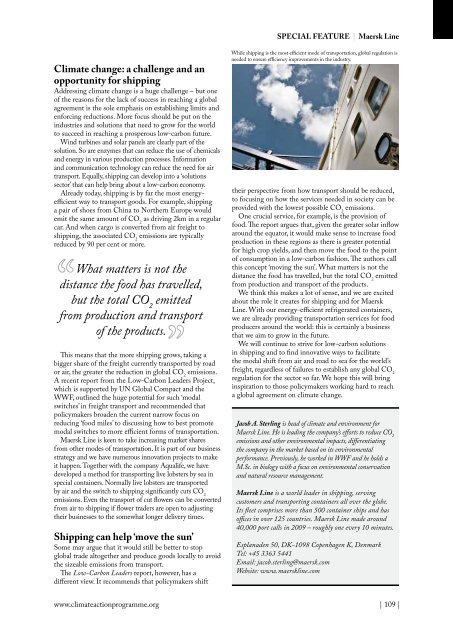Climate Action 2010-2011
Create successful ePaper yourself
Turn your PDF publications into a flip-book with our unique Google optimized e-Paper software.
SPECIAL FEATURE | Maersk Line<br />
<strong>Climate</strong> change: a challenge and an<br />
opportunity for shipping<br />
Addressing climate change is a huge challenge – but one<br />
of the reasons for the lack of success in reaching a global<br />
agreement is the sole emphasis on establishing limits and<br />
enforcing reductions. More focus should be put on the<br />
industries and solutions that need to grow for the world<br />
to succeed in reaching a prosperous low-carbon future.<br />
Wind turbines and solar panels are clearly part of the<br />
solution. So are enzymes that can reduce the use of chemicals<br />
and energy in various production processes. Information<br />
and communication technology can reduce the need for air<br />
transport. Equally, shipping can develop into a ‘solutions<br />
sector’ that can help bring about a low-carbon economy.<br />
Already today, shipping is by far the most energyefficient<br />
way to transport goods. For example, shipping<br />
a pair of shoes from China to Northern Europe would<br />
emit the same amount of CO 2<br />
as driving 2km in a regular<br />
car. And when cargo is converted from air freight to<br />
shipping, the associated CO 2<br />
emissions are typically<br />
reduced by 90 per cent or more.<br />
What matters is not the<br />
distance the food has travelled,<br />
but the total CO 2<br />
emitted<br />
from production and transport<br />
of the products.<br />
This means that the more shipping grows, taking a<br />
bigger share of the freight currently transported by road<br />
or air, the greater the reduction in global CO 2<br />
emissions.<br />
A recent report from the Low-Carbon Leaders Project,<br />
which is supported by UN Global Compact and the<br />
WWF, outlined the huge potential for such ‘modal<br />
switches’ in freight transport and recommended that<br />
policymakers broaden the current narrow focus on<br />
reducing ‘food miles’ to discussing how to best promote<br />
modal switches to more efficient forms of transportation.<br />
Maersk Line is keen to take increasing market shares<br />
from other modes of transportation. It is part of our business<br />
strategy and we have numerous innovation projects to make<br />
it happen. Together with the company Aqualife, we have<br />
developed a method for transporting live lobsters by sea in<br />
special containers. Normally live lobsters are transported<br />
by air and the switch to shipping significantly cuts CO 2<br />
emissions. Even the transport of cut flowers can be converted<br />
from air to shipping if flower traders are open to adjusting<br />
their businesses to the somewhat longer delivery times.<br />
Shipping can help ‘move the sun’<br />
Some may argue that it would still be better to stop<br />
global trade altogether and produce goods locally to avoid<br />
the sizeable emissions from transport.<br />
The Low-Carbon Leaders report, however, has a<br />
different view. It recommends that policymakers shift<br />
While shipping is the most efficient mode of transportation, global regulation is<br />
needed to ensure efficiency improvements in the industry.<br />
their perspective from how transport should be reduced,<br />
to focusing on how the services needed in society can be<br />
provided with the lowest possible CO 2<br />
emissions.<br />
One crucial service, for example, is the provision of<br />
food. The report argues that, given the greater solar inflow<br />
around the equator, it would make sense to increase food<br />
production in these regions as there is greater potential<br />
for high crop yields, and then move the food to the point<br />
of consumption in a low-carbon fashion. The authors call<br />
this concept ‘moving the sun’. What matters is not the<br />
distance the food has travelled, but the total CO 2<br />
emitted<br />
from production and transport of the products.<br />
We think this makes a lot of sense, and we are excited<br />
about the role it creates for shipping and for Maersk<br />
Line. With our energy-efficient refrigerated containers,<br />
we are already providing transportation services for food<br />
producers around the world: this is certainly a business<br />
that we aim to grow in the future.<br />
We will continue to strive for low-carbon solutions<br />
in shipping and to find innovative ways to facilitate<br />
the modal shift from air and road to sea for the world’s<br />
freight, regardless of failures to establish any global CO 2<br />
regulation for the sector so far. We hope this will bring<br />
inspiration to those policymakers working hard to reach<br />
a global agreement on climate change.<br />
Jacob A. Sterling is head of climate and environment for<br />
Maersk Line. He is leading the company’s efforts to reduce CO 2<br />
emissions and other environmental impacts, differentiating<br />
the company in the market based on its environmental<br />
performance. Previously, he worked in WWF and he holds a<br />
M.Sc. in biology with a focus on environmental conservation<br />
and natural resource management.<br />
Maersk Line is a world leader in shipping, serving<br />
customers and transporting containers all over the globe.<br />
Its fleet comprises more than 500 container ships and has<br />
offices in over 125 countries. Maersk Line made around<br />
40,000 port calls in 2009 – roughly one every 10 minutes.<br />
Esplanaden 50, DK-1098 Copenhagen K, Denmark<br />
Tel: +45 3363 5441<br />
Email: jacob.sterling@maersk.com<br />
Website: www.maerskline.com<br />
www.climateactionprogramme.org | 109 |












